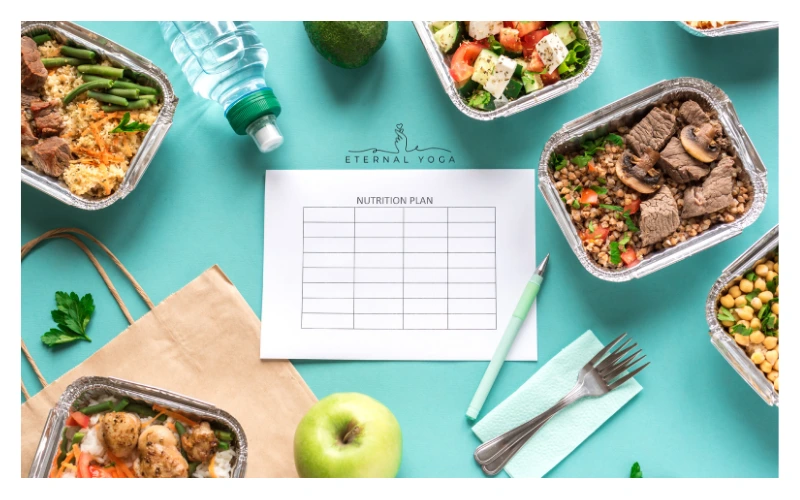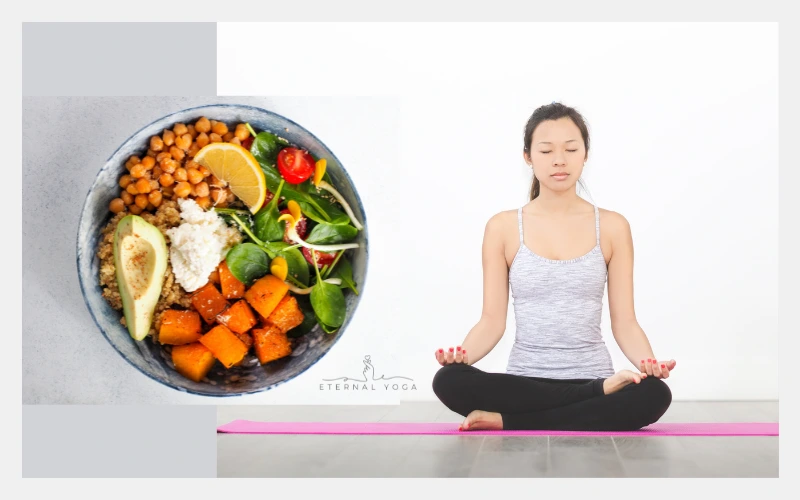If you want to make healthy changes to your lifestyle but don’t know where to begin, Yoga and Nutrition for Beginners could be the perfect starting point for you. This powerful combination not only transforms your body but also improves your mind, energy, and overall health without bogging you down.
Introduction
In today’s fast-paced world, it’s easy to fall into the trap of quick diets and strenuous workouts. But for beginners, these often lead to fatigue and frustration. That’s why Yoga and Nutrition for Beginners is a game-changer. By combining gentle, mindful activities with a balanced diet, you can achieve lasting health improvements – not just short-term results.
Whether you’re looking to lose weight, increase strength, reduce stress, or simply feel more energized, starting with these two basic pillars can put you on a path you’ll enjoy.
Why Yoga is the Perfect Starting Point for Beginners

Yoga isn’t just about flexibility; it’s about connecting your body and mind. For beginners, it offers:
1. Low-Impact, High-Reward Movement
Unlike high-intensity workouts, yoga has a gentle impact on your joints, while also increasing strength, stability, and mobility.
2. Stress Reduction and Mental Clarity
The combination of breathwork, meditation, and slow movement helps reduce anxiety, improve focus, and promote relaxation.
3. Gradual Strength Building
Even beginner yoga poses work multiple muscle groups, helping you tone your body without the need for heavy equipment.
The Role of Nutrition in Your Wellness Journey

No matter how much yoga you do, without proper nutrition, your results will be limited. For beginners, the goal is not extreme dieting, but a balanced diet that energizes your body.
1. Focus on Whole Foods
Choose vegetables, fruits, whole grains, lean proteins, and healthy fats to give your body the vitamins and minerals it needs.
2. Hydration Matters
Drink plenty of water throughout the day; it supports digestion, flexibility, and energy levels.
3. Avoid Overly Processed Foods
Cutting down on sugary snacks and processed foods can help reduce inflammation and aid better recovery from yoga sessions.
Why Yoga and Nutrition Work Best Together
Yoga helps you listen to your body, while good nutrition ensures your body has the fuel it needs. Together, they:
- Support healthy weight management
- Reduce stress eating habits
- Improve digestion and metabolism
- Boost overall energy and mood
This is why so many beginners see faster and more sustainable results when they combine the two.
A Simple Beginner Plan: Yoga & Nutrition Combined

Here’s a simple Yoga and Nutrition for Beginners plan you can start today:
Morning Routine
- Yoga: 15–20 minutes of gentle stretches (Cat-Cow, Child’s Pose, Downward Dog)
- Breakfast: Oatmeal with berries and a sprinkle of nuts for sustained energy
Midday Energy Boost
- Yoga Break: 5–10 minutes of desk yoga or simple breathing exercises
- Lunch: Grilled vegetables with quinoa and a side of lean protein
Evening Wind Down
- Yoga: 10–15 minutes of relaxing poses like Legs-Up-the-Wall or Supine Twist
- Dinner: A light soup or salad with healthy fats like avocado or olive oil
Read More: 10 Minute Morning Yoga Routine
Common Mistakes Beginners Should Avoid
1. Doing Too Much Too Soon
Pushing yourself into advanced yoga poses or strict diets can lead to burnout or injury. Start small and build up gradually.
2. Skipping Meals or Overeating
Yoga helps regulate appetite, but beginners sometimes mistake thirst for hunger. Stay hydrated and mindful.
3. Ignoring Recovery
Rest days are essential. Your body needs time to rebuild muscle and absorb nutrients.
Emily’s Tips to Stay Consistent
- Schedule It: Treat yoga and meal prep like important appointments.
- Listen to Your Body: Adjust your routine if you feel overly sore or fatigued.
- Track Progress: Keep a simple journal of your yoga sessions and meals.
- Seek Guidance: Consider a beginner yoga class or consult a nutritionist to ensure you’re on the right track.
Real-Life Success Story
Sarah, a 32-year-old office worker, started Yoga and Nutrition for Beginners to improve her posture and energy. In just three months, she noticed:
- Reduced back pain
- Better digestion
- A calmer mind
- Steady, healthy weight loss of 8 pounds
Her secret? Consistency and patience are two things that this lifestyle approach naturally encourages.
Conclusion
The beauty of yoga is that it’s not about perfection—it’s about progress. You don’t have to be flexible or follow a strict diet to see benefits. Instead, by combining mindful movements with nutritious food, you create a lifestyle that feels good now and works for years to come.
Frequently Asked Questions
What is nutrition in yoga?
Nutrition in yoga refers to aligning your eating habits with your physical and mental well-being. In yoga philosophy, food is considered prana (life energy). The goal is to choose foods that are fresh, natural, and rich in nutrients and support your practice and overall health.
What is the diet for yoga beginners?
For yoga beginners, the ideal diet is light, nutritious, and easy to digest. Focus on whole, plant-based foods like fresh fruits, vegetables, beans, nuts, seeds, and whole grains. Avoid overly processed and fried foods before practice, as these can leave you feeling heavy and sluggish.
What is the relationship between yoga and nutrition?
Yoga and nutrition work together to create a healthy and balanced lifestyle. Yoga strengthens and relaxes the body while calming the mind, and proper nutrition boosts this process by providing your body with the necessary vitamins, minerals, and energy.
What is the best way to start yoga and nutrition for beginners?
Nutrition in yoga means aligning your eating habits with your physical and mental health. In yoga philosophy, food is considered prana (life energy). The goal is to choose foods that are fresh, natural, and rich in nutrients and support your practice and overall health.
How many times a week should beginners practice yoga?
For yoga beginners, 2–4 sessions per week is ideal. This frequency allows your body to adapt and build flexibility without overexertion. As your strength and stamina improve, you can increase your practice time.
Can yoga alone improve my health without changing my diet?
Yoga offers great physical and mental benefits, but pairing it with proper nutrition significantly enhances results. For yoga and nutrition for beginners, combining mindful movement with a healthy eating plan leads to better energy levels, weight management, and overall wellness.
What are some beginner-friendly yoga poses?
Some great poses for beginners include Mountain Pose, Downward-Facing Dog, Warrior I, and Tree Pose. These moves are simple, improve posture, and help build the foundation for more advanced practices.









Comments are closed.